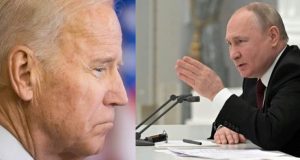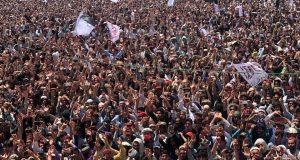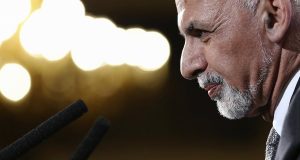She is called the Chancellor of Europe and she says, “If the Euro falls, then Europe falls”
By stating, to build a multicultural society in Germany had utterly failed, migrants should integrate and adopt Germany`s culture and values, she can rely on the public opinion
For the most people, she is very difficult to know, but this is the reason for her success. Being an east German gave her some advantages: Self-discipline, strength of will, silence as essential tools.
Everything was a question of survival in the socialist state of GDR (German Democratic Republic), the nondemocratic east state of both Germany that failed in 1989. So it was impossible to make errors if you wanted to succeed.
Rainer Eppelmann, her colleague, once stated:
“Most of the 95% GDR`s were whisperers. They never said what they thought, what they felt, what they were afraid of. Even today we are not completely aware what this did to people. Nobody could be a hero 24 hours a day. The whisperer thinks: How can I say this without damaging myself? He is one, might be compared to a chessplayer. He might find it easier to learn in his new life, to wait and see, and not just burst out at once – to think things over before speaking.”
And Angela Merkel expressed her way of acting during the campaign for chancellor in 2005:
“I decided that if the system became too terrible, I would have to try to escape. But if it wasn`t too bad, then I would not lead my life in opposition to the system, because I was scared of the damage that would do to me”. She admitted: ” I acted later in such a way that I would not have to live in constant conflict with the state.”
Former minister Michael Naumann classify her as a person who is a learned but not born democrat and her attitude to U.S. is learned attitude.
Critics and supporters like to describe her as a gifted tactician without a larger vision. People are going so far to claim, there is no project, no idea. Just a zigzag of smart moves for 9 years. She had no political agenda at all.
Psychologically, she gives everybody the feeling of “I will take care of you”.
But there is a deep lack in her sense of percepting public opinion, she made two big mistakes in her career. No doubt, the biggest was, she came out in favour of the U.S. invasion of Iraq, describing it as unavoidable and to confirm President George Bush, that under her leadership of a government, Germany would join the US – coalition. If this statement was decisive for becoming later chancellor remains to be seen by the fact, she succeeded in an election which was not unequivocal. By accusing Chancellor Schröder of that time of anti-Americanism, though most of the generals of the U.S. military were warning to step into Iraq, because of the need to draw off troops and military equipment from anti-terror war in Afghanistan, obviously seemed to satisfy the Bush administration.
Her perfect instinct for power is her main characteristic. Critizising her former mentor Helmut Kohl, she advocated a fresh start for the party without him after a party funding scandal that compromised many leading figures of the Christian Democratic Union (CDU) – including the successor of Helmut Kohl – Wolfgang Schäuble.
Merkel was subsequently elected in 2000 to replace Schäuble after lost elections in 1998. She became the first female leader of a German party. Her election surprised many observers, as her personality offered a contrast to the party. She is a centrist Protestant from Northern Germany, while her party, the CDU, is a male-dominated, socially conservative with strong holds in western and southern Germany, they have deep catholic roots.
Her instinct for power let her neutralize the opposition by stealing it`s issues. Concerning the exit of atomic industry after the Fukushima disaster toward alternative energies and later welcoming the refugees of a terrible war at Syria, western politics ignored for years, which brought her and Germany much sympathy. Even of the critical holocaust survivor Ruth Klüger, scientist of literature, and living now in the States, who only followed the invitation to the parliament “Bundestag” on the Holocaust Remembrance Day just of Merkel`s heroic sentence: “We manage it!”
To highlight her political actions and attitudes, first have a look on her foreign politics which influences enourmously her decisions about the inner state of Germany. One of her priorities was also to strengthen transatlantic economic relations by signing the agreement for the Transatlantic Economic Council on 30th of April 2007. This bases on her advocation for a strong transatlantic partnership and German – American friendship, she announced already in Spring 2003 towards President Bush concerning the Iraq war, defying strong public opposition in Europe and overseas.
In terms of economic views she sticks to more neo-liberal decisions. Merkel supported a substantial reform agenda concerning Germany`s economic and social system, and was considered more pro – market than to emphasise the social principle which is fixed in the constitution, more than her own party ( the CDU ).
She advocated German labour law changes, specially removing barriers to laying off employers and increasing the allowed number of work hours in a week. Her argument: “Existing laws make the country less competitive, because companies cannot easily control labour costs when business is slow.”
In contrast she stated her main aim of her government would be to reduce unemployment and that is the issue on which her government will be judged. There is to record some progresses in the official lists, but a detailed look immediately points out most of the employees cannot live on the base of 1 Euro jobs, of badly paid temporary work, to be forced to stock up by Hartz-4 under rigid conditions of total control of job centers. A minimum wage in contrast to UK and Denmark, needed too much time to be decided, market arguments are still critizising it. But for this it needed better conditions for small employers, they are not yet improved, so these decisions are just pieces. A conditional basic income, some European countries plan to test now, would put down the enormous social costs of the cities, arised by the expensive buerocracy. The cities just receive 36% of the taxes, in Denmark 60%, a conditional basic income would be financed by the better financially supplied Federation by lower costs. A sight over the borders to other countries like Denmark shows how Germany is behind modern developments for it`s citizens though our constitution based on the social state principle.
Angela Merkel`s focus on groups and lobbies aims for the controversial Transatlantique Free Trade Area, most of the Europeans have fear to loose basic rights by this agreement.
She favors the Association Agreement between Ukraine and the European Union, but its implementation depends on reforms in Ukraine. She also accepts the strategic partnership with Russia, born in the “Axis against Iraq war” between Russia, German and France in 2003.
Merkel and former Indian Prime Minister Manmohan Singh made a “Joint Declaration” emphasising the Indo-German strategic partnership in 2006. This partnership with India was strengthened with Merkel`s visit to India in 2011. It turned the focus on scientific and economic aims, means of future cooperation onto the fields of energy, science and technology, and defense. For this she got the Jawarhar Lal Nehru Award for International Understanding for the creation of a world better positioned to handle the emerging challenges of the 21st century.
She led seven trade delegations to China. There is no focus on critizising human rights violations, just common declarations.
In 2007, Merkel was President of the European Council and chaired the G-8. She played a central role in the negotiations of Treaty of Lisboa and the Berlin Declaration. Germany is contributing now by military missions according to NATO decisions in Africa and Afghanistan.
It has been said, she played a crucial role in managing the financial crisis at the European and international level, and has been referred to as ” the decider”. Others find her too slow and unimaginative doing too little too late, suggesting, her leadership was disappointing. She makes ever effort not to be interesting.
Major issues during her leadership and Chancellorship have been domestic policy, health care reform and problems concerning energy development.
Merkel has been described as the defeater leader of the European Union. She is currently the G7 leader. In May 2015, she was named the most powerful woman in the world for a record ninth time by Forbes. She has been compared by many in the English language press to former British Prime Minister Thatcher.
Since 2010 the chancellor is cooperating with partners in the eurozone and outside to stabilize the Euro. She believes in budgetary discipline, solidarity and incentives for more growth. France is a particularly important partner.
If the Euro falls, then Europe falls, she declared. The Euro was saved, but at the prize of ruinous austerity policies and high unemployment. Merkel is resented as a rigid, self-righteous puritan, while support for the EU has fallen to historical lows.
“Europe makes Germany bigger.” she has to hold Europe together and this is a balance act. The ongoing monetary crises of the eurozone has turned Germany, Europe`s largest creditor nation, into a regional superpower.
She is called Chancellor of Europe. While most of Europe stagnats, Germany is an economic juggernaut, with low unemployment and a resilient manufacturing base.
With her historical welcome culture to refugees, she gained the respect and sympathy of the whole world. Germany is considered now to be the best country in the world.
But the organization problems of integrating refugees and in view of huge refugee numbers arise big critic by her sister party, the CSU of Bavaria and several citizens. It contributes to the rise of the AFD, a right wing party with ties to Neonazis. Now she is in the reserve, beacause she promised: “We can manage it. ” The structure problems of Germany become now obvious, but it seems the country is lamed to change these structures efficiently. The lack of imagination is no help in this crisis and the closing of the borders will set back the European thought and economy. The refugee crisis is her biggest challenge in her political career and she is forced to grow out of herself.
Former critising the government`s support for the accession of Turkey to the European Union and favouring a “privileged partnership” instead and now setting on the help of Turkey concerning the enormous number of refugees, bring her into difficulties to wage.
By stating, to build a multicultural society in Germany had utterly failed, migrants should integrate and adopt Germany`s culture and values, she can rely on the public opinion.
Her biography confirms the critics of her reign. Born as Angela Dorothea Kasner in Hamburg on the 17th of july in 1954, her family moved with her to Quitzow in Brandenburg, and three years after that, to Templin.
Her father, a protestant pastor and her mother, a teacher of English and Latin and a member of the Social democratic party were totally adapted to the GDR system. Merkel has polish roots, the original name of the family was Kazmierczak. Many ancestors of her have been in the past in official political functions. She became a member of the FDJ district board ( FDJ = Free German Youth) and secretary of the “Agitprop” (Agitation and Propaganda).
The President of Germany, Joachim Gauck, who is a former protestant pastor, once commented on the father of Angela Merkel, the most pastors avoided contact to him, because of his too big loyalty to the socialistic state. They feared him. Angela shall have been reserved to the state values, but she always acted in opposition to her secret opinions. She lived adapted to the GDR state. After matriculation she could study physics at the University of Leipzig though she had academic parents. Normally, she would have been forced to an apprenticeship before studying in this system. It shows how privileged she was. As a former research scientist, she earned a doctorate as a physical chemist. She learned analysing, waging, so later she took this scientific view as a help to wage her political decisions.
 Angela Merkel with the last and first democratic Minister, President Lothar de Maizière
Angela Merkel with the last and first democratic Minister, President Lothar de Maizière
In 1977 Angela Kasner married physics student Ulrich Merkel and took his surname. She was divorced in 1982. In 1998 she married her second husband, professor of chemistry, Joachim Sauer. Though she has no children, she is often called “Mutti” (mom) by the nation.
 Angela Merkel with her husband Professor Joachim Sauer
Angela Merkel with her husband Professor Joachim Sauer
She joined the opposition in the GDR, the political movement called “Demokratischer Aufbruch” (Democratic awakening) by accident, which later became a political party. It merged with the Eastern German CDU. In 1994, Merkel was appointed Federal Environment Minister in the cabinet of Helmut Kohl, CDU.
In 1998, she was elected to a Secretary General of her party, CDU. In september 2005, she was a protégee of Chancellor Kohl, she won the early elections to the parliament, the “Bundestag”. Beating then Chancellor Schröder in 2005, she was elected to the first female chancellor of Germany in a big coalition of CDU, CSU and SPD and was confirmed in following elections till now.
Merkel`s ability to correct former false decisions, she often proved, her ability of adaption to new political challenges, will decide if she has a political future in consideration of the refugee crisis. It remains thrilling.
Writer: Claudia Waedlich
The writer is a Germany based columnist and correspondent with THE PASHTUN TIMES. She is a literary writer, lawyer and politician. She can be reached at
claudia.waedlich@gmail.com
ALL RIGHTS RESERVED WITH THE PASHTUN TIMES
 Pashtun Times Latest News
Pashtun Times Latest News



 Angela Merkel with the last and first democratic Minister, President Lothar de Maizière
Angela Merkel with the last and first democratic Minister, President Lothar de Maizière Angela Merkel with her husband Professor Joachim Sauer
Angela Merkel with her husband Professor Joachim Sauer



